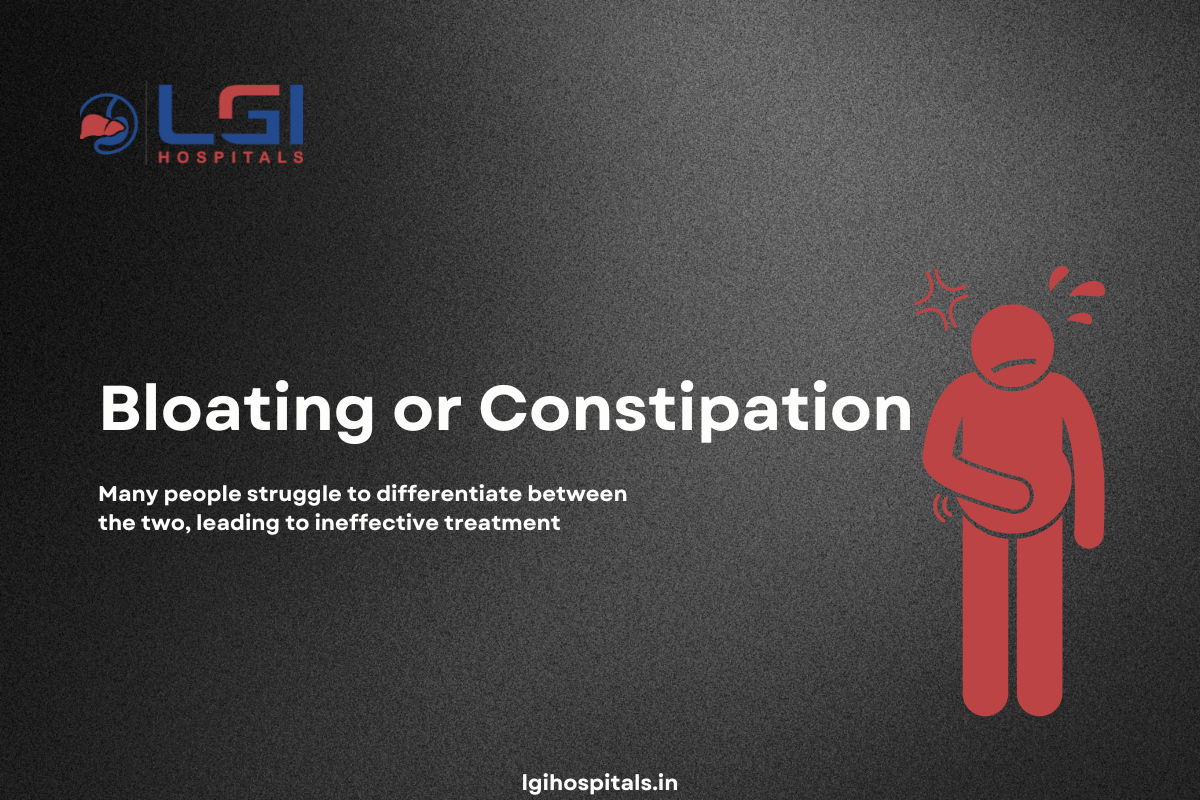Digestive discomfort can be confusing, especially when the symptoms of bloating and constipation overlap. Many people struggle to differentiate between the two, leading to ineffective treatment and prolonged discomfort.
Both conditions can cause a swollen abdomen, discomfort, and an overall uneasy feeling, but they have different causes and require different approaches for relief. This article will explain the key differences between bloating and constipation, their symptoms, causes, and the most effective ways to manage them.
What Is Bloating?
Bloating is a condition where the abdomen feels swollen, tight, or full due to excess gas or fluid retention in the digestive tract. It is often temporary but can cause significant discomfort.
Common Symptoms of Bloating:
- A swollen or distended stomach
- A feeling of fullness even after eating a small amount
- Excessive gas, burping, or flatulence
- Gurgling or rumbling sounds in the stomach
- Mild to moderate stomach pain or cramping
What Causes Bloating?
Bloating is primarily caused by gas buildup in the intestines, which can occur due to various factors, including:
- Overeating or eating too fast
- Consumption of gas-producing foods (beans, lentils, carbonated drinks, cruciferous vegetables)
- Food intolerances (lactose intolerance, gluten sensitivity)
- Swallowing air while chewing gum or drinking through a straw
- Imbalance of gut bacteria
- Digestive disorders such as Irritable Bowel Syndrome (IBS)
Bloating is often relieved once the body expels the excess gas through burping or passing gas.
What Is Constipation?
Constipation is a condition in which bowel movements become difficult, infrequent, or painful. It is characterized by the passing of hard, dry stools and a feeling of incomplete evacuation.
Common Symptoms of Constipation:
- Fewer than three bowel movements per week
- Straining during bowel movements
- Hard, lumpy stools
- A sensation of blockage in the rectum
- Bloating or discomfort in the lower abdomen
What Causes Constipation?
Constipation occurs when stool moves too slowly through the digestive tract, leading to hard and dry stools. The most common causes include:
- Low fiber intake
- Dehydration
- Lack of physical activity
- Ignoring the urge to have a bowel movement
- Certain medications (painkillers, antidepressants, iron supplements)
- Stress and hormonal imbalances
Chronic constipation can lead to complications such as hemorrhoids, anal fissures, or fecal impaction if left untreated.
How to Differentiate Between Bloating and Constipation
Since both conditions can cause abdominal discomfort, it is important to distinguish between them for proper treatment.
| Feature | Bloating | Constipation |
| Main Cause | Excess gas or fluid retention | Slow stool movement and hard stools |
| Feeling in Stomach | Swollen, tight, or full | Heavy, sluggish, or blocked |
| Bowel Movements | Normal or excessive gas | Infrequent, hard stools |
| Pain Location | Upper or middle abdomen | Lower abdomen |
| Relief Methods | Releasing gas, probiotics, avoiding trigger foods | Fiber-rich diet, hydration, exercise |
If you feel gas buildup and excessive burping, you are likely experiencing bloating. If your primary issue is difficulty passing stool, it is more likely constipation.
Best Remedies for Bloating and Constipation
The good news is that both conditions can often be managed with dietary changes and lifestyle adjustments. Below are some of the best remedies for each condition.
How to Relieve Bloating
- Eat Slowly – Chewing food properly prevents excessive air swallowing, which reduces gas buildup.
- Avoid Gas-Producing Foods – Limit consumption of beans, dairy, cruciferous vegetables, and carbonated beverages.
- Take Probiotics – Consuming probiotic-rich foods such as yogurt, kefir, and kimchi can help balance gut bacteria.
- Drink Herbal Teas – Peppermint, ginger, and fennel tea can relax the digestive tract and reduce bloating.
- Exercise Regularly – Movement stimulates digestion and helps release trapped gas.
- Stay Hydrated – Drinking plenty of water helps prevent water retention, which can contribute to bloating.
How to Relieve Constipation
- Increase Fiber Intake – Fiber-rich foods like fruits, vegetables, whole grains, and legumes add bulk to stools and promote regularity.
- Drink More Water – Proper hydration softens stools and makes them easier to pass.
- Exercise Daily – Regular physical activity stimulates bowel movements and prevents sluggish digestion.
- Use Natural Laxatives – Foods like prunes, flaxseeds, and aloe vera juice can help alleviate constipation naturally.
- Avoid Processed Foods – Processed foods often lack fiber and contribute to slow digestion.
- Maintain a Routine – Using the bathroom at a consistent time each day can train the body for regular bowel movements.
When to See a Doctor
While occasional bloating and constipation are common, persistent digestive issues may indicate an underlying health condition. You should consult a doctor if you experience:
- Severe or chronic bloating that does not improve with dietary changes
- Constipation lasting more than three weeks despite lifestyle modifications
- Unexplained weight loss
- Blood in stools
- Severe abdominal pain or cramping
If you are struggling with bloating or constipation and need professional guidance, LGI Hospital provides expert digestive health care. Their team of specialists can diagnose the root cause of your symptoms and recommend effective treatments.
Schedule an appointment with LGI Hospital today for personalized digestive health solutions.

